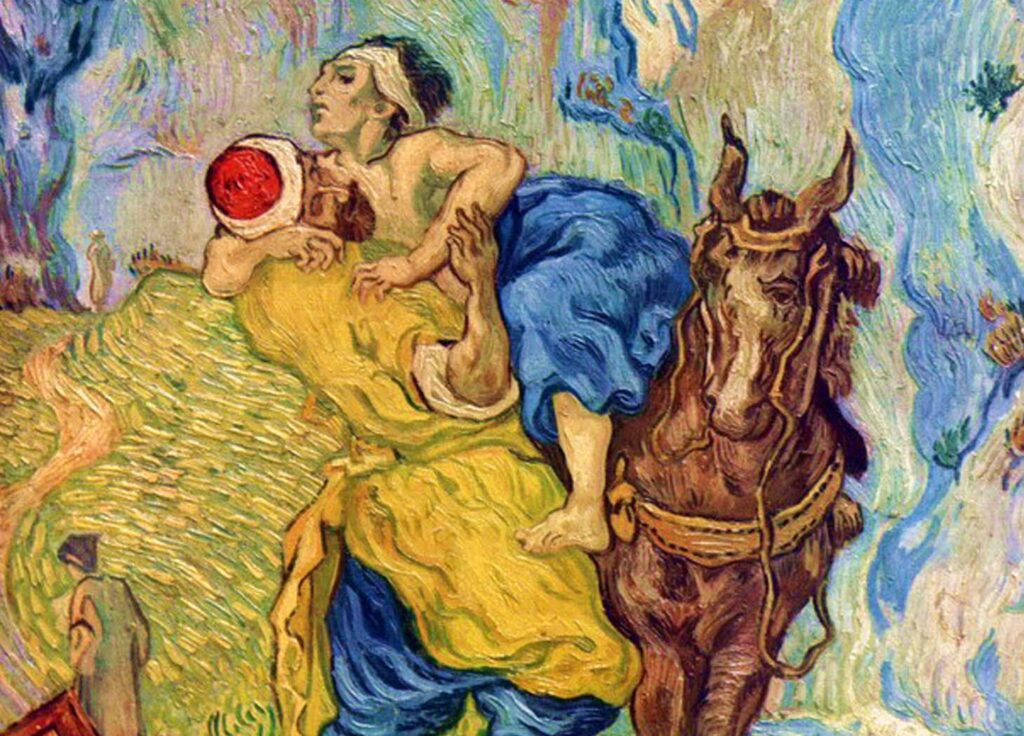It is hard to hear the reading from chapter 10 of Luke’s Gospel this Sunday and not wonder how people who espouse to be followers of Jesus could harbor such fear and antipathy toward refugees and migrants as we see in so many parts of our world today.

The Good Samaritan by Vincent Van Gogh (1890)
Yes, it is a complex social and economic issue that defies simplistic solutions. Yes, it has been politicized to the extent that in our polarized societies, we reduce our logic to either/or options that leave little room for creativity or compromise. And, at the most essential level, it is a humanitarian question of how we see and treat our neighbor, who as Jesus instructs us, also includes the stranger, not only people of our same family, race, national or cultural heritage. The story of the Good Samaritan is intended to challenge all the conventional ways of thinking about the people we’ve been taught to discriminate against or fear, to shed light on our hypocrisy and spark insight into what it means to be “good.”
To be “good,” Jesus seems to be suggesting that we are called to widen the scope and circle of our awareness to those who are suffering just out of view. To be “good,” we are called to go beyond commitment and care for those who are part of “us” and to discover a sense of kinship and connection with those who are part of “them.” In fact, Jesus calls us to see and relate to others as he does, as brothers and sisters who have inherent dignity, as children of God. To be “good,” Jesus expects us to put our compassion into action, not only words or prayers, and to invest something of ourselves, including our hard earned money, to care for those who cannot care for themselves.
If we feel a kind of resistance to taking a hard look at this story and the way Jesus holds up a mirror to our contemporary society, then we are in “good” company, because certainly the disciples and other followers of Jesus felt the same. For a law abiding, Temple worshipping Jew, the Samaritans were considered not only outsiders, but blasphemers whose mere shadow could be a source of ritual impurity. As modern people who are distant from the reality of the context of Jesus’ time and place, we’ve generally lost the sense of sensitivity to the way this story must have stung his listeners. He was suggesting that their traditional enemy was the real moral hero of this story, and he was calling them to conversion from their self righteous, socio-centric views, from their prejudices and their fears of those whose customs they didn’t understand.
As leaders in the Christian tradition today, we must read the signs of the times and this requires us to look through the lens of this and the rest of Jesus’ stories to see clearly our reality. The Gospels, and parables like this one will support some of our contemporary social conventions and values and they will challenge others. Are our times identical to those of Jesus, that we can simply make a literal interpretation and application of all his moral instructions? No. But our human nature is largely unchanged, and this means that many of the instincts, fears, and basic motivations that Jesus addressed in his times are consistent with ours: the tendency to identify with those who are like us and to fear and even hate those who are different; the tendency to limit the scope of our sense of kinship and to protect our resources from those who are not “us,”; and the tendency to not only not see the equal and inalienable dignity of others, but even to objectify and dehumanize them, as we see happening today.
What are we to do with this parable, but allow it to challenge and change us, allowing it to lead us beyond the limits of our current ways of perceiving and making sense of our differences from others, our rights and theirs. “You are to love God with all your heart, all your strength, all your mind, and to love your neighbor as yourself.” When we begin to see others as ourselves, how can we not see our common ground, the similarities outnumbering our differences, and the sense of our shared humanity? We find ourselves carried beyond our fears and insecurities, and experience the joy of not only relating to people who are different from us, but of offering our goodness in concrete forms of hospitality and material care. This is the goodness that makes for true greatness in the eyes of the Lord, and the basis for the kind of leadership that the world desperately needs today. This is the goodness of God, flowing through us, for us and for all of our brothers and sisters.
With you on the road,




